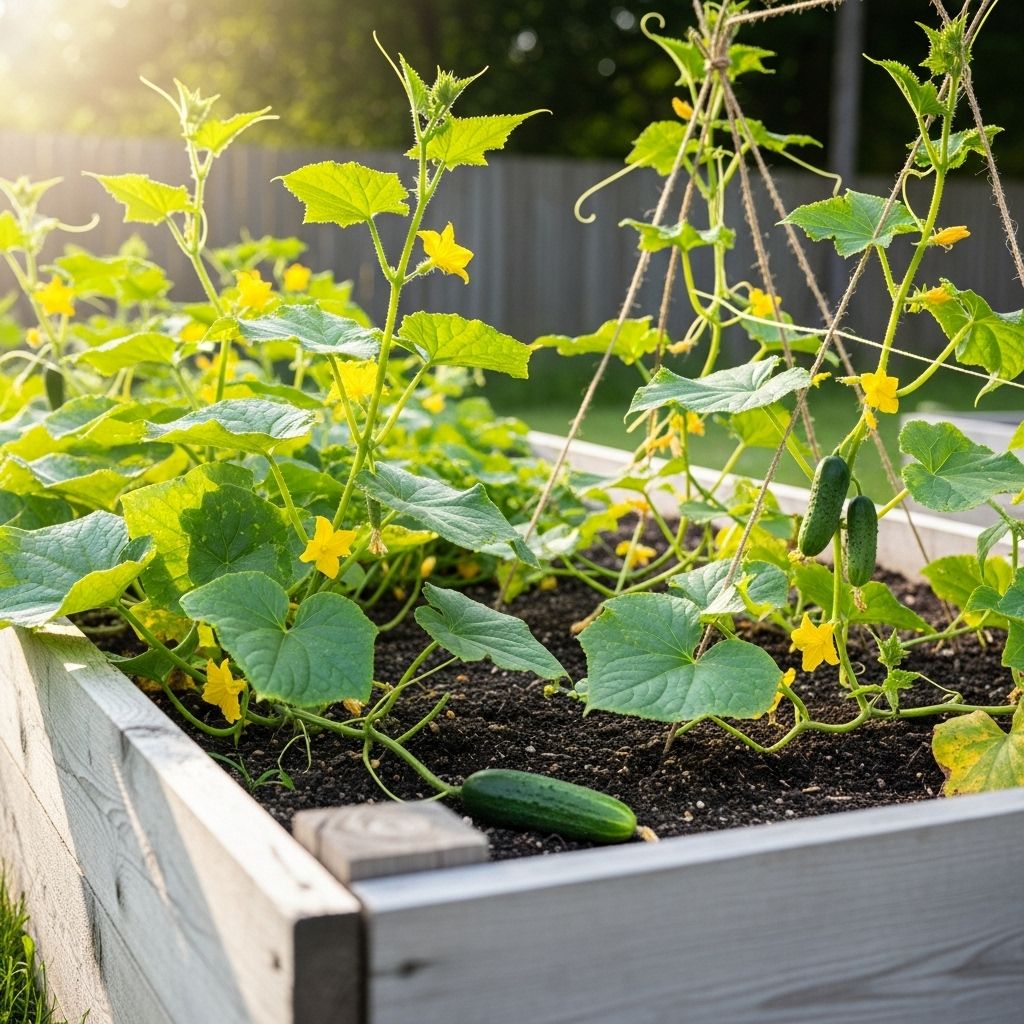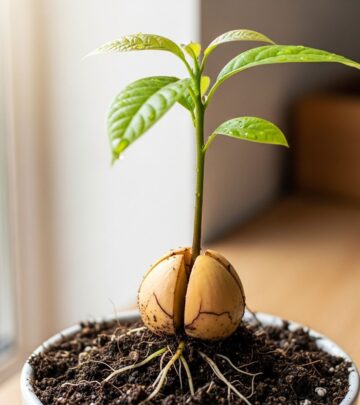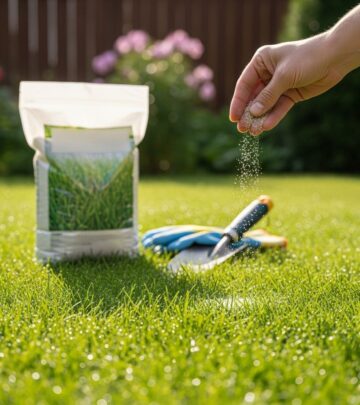17 Essential Tips for Growing Cucumbers in Raised Beds
Enjoy healthy vines and flavorful harvests with minimal effort and smart care.

Growing Cucumbers in Raised Beds: 17 Essential Tips for Success
Are you considering growing cucumbers in your raised garden beds this season? Raised beds offer many advantages for productive and healthy cucumbers—if you know the right techniques. Below, discover practical, expert-approved tips to help you achieve your most prolific cucumber harvest yet.
Why Cucumbers Love Raised Beds
Raised beds are ideal for cucumbers and other vegetables because they provide:
- Superior soil drainage compared to planting directly in the ground.
- Less soil compaction, encouraging deeper root growth.
- Earlier soil warming in spring, resulting in faster germination and earlier growth.
- Reduced weed pressure and fewer soil-borne diseases.
- Efficient space management—perfect for urban and small-space gardeners.
- Attractive landscaping appeal, neatly organizing garden spaces.
Whether you construct your raised beds from cedar, metal, or recycled materials, the structure allows you to optimize soil quality and growing conditions for a bountiful cucumber harvest.
Top Tips for Growing Cucumbers in Raised Beds
1. Choose the Right Cucumber Variety
There are two main types of cucumber growth habits:
- Bush types: Compact, tidy, excellent for smaller raised beds or container gardens.
- Vining types: Produce longer vines, higher yields, and need more space or support—ideal for trellising.
Consider your space and preferences (fresh eating vs. pickling) to select the best variety for your garden.
2. Optimize Your Soil Mix
Cucumbers thrive in well-draining, nutrient-rich soil. The optimal raised bed mix for cucumbers typically includes:
- a balance of compost for nutrients
- loam or high-quality topsoil for structure
- coconut coir or peat moss for moisture retention
- perlite or coarse sand for improved drainage
Aim for a soil pH between 6.0 and 7.0. Regularly amend beds with compost at the start of each season to replenish organic matter.
3. Start Seeds Directly or Use Healthy Transplants
- Direct seeding is recommended after the soil warms in spring (at least 65°F/18°C).
- If starting indoors, transplant only once all danger of frost has passed and plants have two to four true leaves.
4. Proper Plant Spacing
| Type | Recommended Spacing |
|---|---|
| Bush Cucumbers | 12-18 inches apart |
| Vining Cucumbers (with trellis) | 12 inches apart |
| Vining Cucumbers (without trellis) | 36 inches apart (rows or mounds) |
Do not overcrowd—the extra airflow helps prevent mildew and disease pressure.
5. Install a Sturdy Trellis or Support System
- Most cucumber varieties benefit from vertical growth, which conserves bed space and keeps fruit cleaner and healthier.
- Options include arbor trellises, netting, obelisks, or tomato cages. Choose a design that suits your bed and makes harvesting easy.
- Regularly train vines up the support by gently wrapping tendrils or threading vines.
6. Mulch Generously
Apply a 2-3 inch layer of organic mulch (straw, shredded leaves, or compost) around cucumber plants to:
- conserve soil moisture
- keep fruits off the soil, reducing rot and disease risk
- regulate soil temperature
- suppress weeds
7. Water Consistently and Deeply
- Cucumbers need even, consistent moisture—aim for 1 inch of water per week.
- Water at the soil level to avoid wetting the foliage, which can help prevent fungal issues.
- Consider a drip irrigation system or soaker hose for efficiency, especially in hot weather.
8. Fertilize for Optimal Growth
Feed your cucumber plants at planting with a balanced, slow-release organic fertilizer.
- As vines set fruit, supplement with a fertilizer higher in potassium and phosphorus (e.g., tomato or vegetable formulas).
- Avoid excess nitrogen, which encourages leafy growth but can reduce fruiting.
9. Monitor for Pests and Diseases
- Common pests include cucumber beetles, aphids, spider mites, and squash bugs.
- Diseases to watch for: powdery mildew, downy mildew, bacterial wilt.
- Pest management tips:
- Handpick pests early in the morning.
- Use insect netting or row covers for small seedlings.
- Encourage pollinators and beneficial insects.
- Remove infected leaves/fruit and dispose of away from the garden.
10. Practice Crop Rotation Each Year
Avoid planting cucumbers in the same spot (or after other cucurbits like squash or melons) for at least two years to reduce disease buildup in the soil.
11. Harvest Frequently and at the Right Size
- Regular harvesting encourages continued production.
- Pick cucumbers while they’re young and firm; overripe fruit can slow down further fruiting.
- Bush types are usually ready at 6-8 inches, while vining types vary by variety.
- Use pruners or scissors to avoid damaging the vine when cutting fruit.
12. Prevent Bitter or Misshapen Fruit
- Ensure plants never dry out completely—drought stress leads to bitterness.
- Consistent feeding and watering help minimize oddly-shaped cucumbers.
13. Provide Shade in Hot Climates
High temperatures (above 85-90°F/29-32°C) can stress cucumbers. Provide afternoon shade using shade cloth, especially in southern gardens, to prolong production during heatwaves.
14. Plan for Successive Sowings
- Sow a second round of seeds 2-4 weeks after the first for a longer harvest window.
- In regions with mild summers, plan a late-summer sowing for fall harvest.
15. Pinch or Prune for Better Growth
- Pinch tips of vigorous vining cultivars to promote branching and bushiness, especially when you’re short on vertical space.
- Remove yellowed or diseased leaves regularly to maintain healthy growth.
16. Integrate Companions and Avoid Poor Neighbors
Good cucumber companions:
- Beans (add nitrogen to soil)
- Dill (repels pests)
- Radish (deters cucumber beetles)
- Marigolds and nasturtiums (pollinator magnets, pest deterrent)
Avoid: potatoes, strong-scented herbs like sage, and plantings near melons or squash to reduce pest and disease issues.
17. Enjoy the Benefits!
With smart planning and consistent care, you can expect:
- Abundant yields of crisp, delicious cucumbers
- Fewer common issues compared to growing in-ground
- Easy maintenance and harvests—plus a tidy and visually appealing garden
Frequently Asked Questions (FAQs)
Q: What is the best soil for growing cucumbers in raised beds?
A blend of compost, loamy topsoil, and organic matter (such as coconut coir or peat moss) with added perlite or sand for drainage is ideal. Aim for pH 6.0–7.0.
Q: How often should I water cucumbers in raised beds?
Maintain evenly moist soil, watering deeply 1–2 times weekly (more in hot or dry weather) so beds don’t dry out between waterings.
Q: Do I need to trellis my cucumbers?
Vining types benefit from trellising, which saves space, keeps fruit clean, and makes harvesting easier. Bush types are more compact but can still be trellised for airflow and tidiness.
Q: When is the best time to plant cucumbers in raised beds?
Wait until the soil temperature is at least 65°F (18°C) and all danger of frost has passed—typically late spring to early summer, depending on your region.
Q: How do I prevent bitter cucumbers?
Prevent water stress by watering regularly and deeply, keeping the soil consistently moist but not soggy. Harvest fruits promptly when young and firm.
Quick Reference Table: Cucumber Raised Bed Tips
| Tip | Benefit |
|---|---|
| Compost-rich soil | Promotes strong, vigorous plants and abundant harvests |
| Trellis support | Saves space, keeps fruit clean, eases harvesting |
| Consistent watering | Reduces stress, prevents bitterness and misshapen fruit |
| Mulch | Moisture retention, weed suppression, temperature moderation |
| Good spacing | Promotes airflow, reduces disease |
| Pest management | Protects harvest from common cucumber pests and diseases |
Final Thoughts
Growing cucumbers in raised beds offers remarkable advantages—superior yields, healthier plants, and straightforward maintenance. With these expert-backed tips, you’ll be on your way to lush, productive vines and a season full of crisp, flavorful cucumbers!
References
- https://www.epicgardening.com/cucumbers-raised-beds/
- https://www.youtube.com/watch?v=hATTga9A-7M
- https://www.walmart.com/ip/Epic-Gardening-Cucumber-Seed-Bundle-MVR1-nbsp-2-Non-GMO-Varieties-Includes-Double-Yield-Tendergreen-Cucumbers-Perfect-Salads-Snacking-Pickling-Great/16963612617?wmlspartner=wlpa&selectedSellerId=102795361&selectedOfferId=3BB86ECF475F3479ACDD521E04F4D46D&conditionGroupCode=1
- https://www.epicgardening.com/best-raised-bed-garden-layout/
- https://www.youtube.com/watch?v=x_XcdL8pwJw
Read full bio of Shinta












